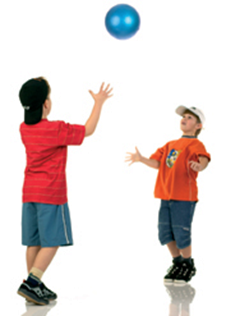Acquisition of fine motor skills
The term "motor skill" describes the ability to perform coordinated movements quickly, with high precision, and with low energy expenditure. Fine motor skills have particularly high demands on precision and efficiency. Motor development proceeds in different phases throughout life, from coarse to fine, and from inefficient to efficient.
Content
Aptitude vs. Ability
First, a distinction must be made between the term "aptitude" and the term "ability". Aptitude describes the basic ability to perform certain movements, such as walking or grasping. The term "motor skill" describes the superior ability to perform coordinated movements in a given context quickly, with high precision and with low energy consumption, such as playing an instrument. Motor skills usually refer to fine motor skills, but also to gross motor skills, such as throwing a ball in a sport. Motor learning leads to gradual improvement in timing, accuracy and efficiency. Learning motor skills depends largely on age, but also on environmental influences and the level of experience of the learner. Throughout life, motor development proceeds in seven phases: reflexive, rudimentary, basic, athletic, refinement, peak performance, and then regressive in old age.
Gross motor skills
Gross motor skills initially involve large muscle groups and joints to perform basic motor tasks such as maintaining balance or running and jumping. Gross motor skills are mostly learned in early childhood. Normally, by age 5, the gross motor skills needed for postural control and mobility should be acquired. The age range between 3 and 5 years is a critical period for the acquisition of motor skills in children because it is the time when the basic neuroanatomical structures of the brain are formed. A typical feature of these gross motor skills learned at an early age is that they are preserved throughout life, that is, they cannot be lost.
As proficiency progresses, more and more complex skills are learned, for example throwing and catching a ball, which are already very close to what we would call sports. These skills are already characterized by a very high level of complexity. They require not only a high degree of hand-eye coordination and orientation, but also a high degree of automaticity of movements, anticipation and pre-planning of movements, as the movements are too fast to be controlled consciously in detail.

Ball throwing - Catching
Fine motor skills
Finally, fine motor skills involve smaller muscle groups and joints to perform corresponding smaller motor tasks, mainly with the hands or fingers. These skills and the fine motor skills that rely on them are learned later and are largely subject to voluntary learning, as in the case of writing or playing an instrument. Fine motor learning is often externally triggered and therefore requires more motivation and willpower than gross motor learning, which is largely learned intrinsically. Performing fine motor skills often requires great precision, which is particularly challenging for the learning process. Unlike intrinsic learning, an external goal is often set, which prevents certain aspects of self-organization of learning.
Fine motor learning is also highly dependent on other individual factors such as previous experience, developmental level, personality, environmental influences or learning environment. Gender can also make a difference. Although there is no evidence of a gender difference in motor skills, girls seem to acquire manual dexterity earlier than boys, while boys show better performance in more movement-oriented activities such as running or throwing. However, these gender differences may be the result of environmental factors, as girls are more often encouraged to engage in fine motor activities and boys are more likely to engage in dynamic movement activities.
The maintenance of fine motor skills depends more on the frequency of use ("use it or lose it"), and brain damage affects fine motor skills more easily than gross motor skills.
What does this mean for my teaching practice?
Motor learning is largely subject to self-organization. However, factors such as previous experience, motivation or will are also decisive. Individual support should take all these factors into account.
Reflection question
Is the successful learning of motor skills only dependent on talent?
Quiz
1) Why is learning fine motor skills harder than learning gross motor skills?
A) High precision requirements
B) Less time available
C) Faster execution
2) What could be a reason why girls often seem more skilled than boys?
A) better understanding
B) more discipline
C) more previous experience